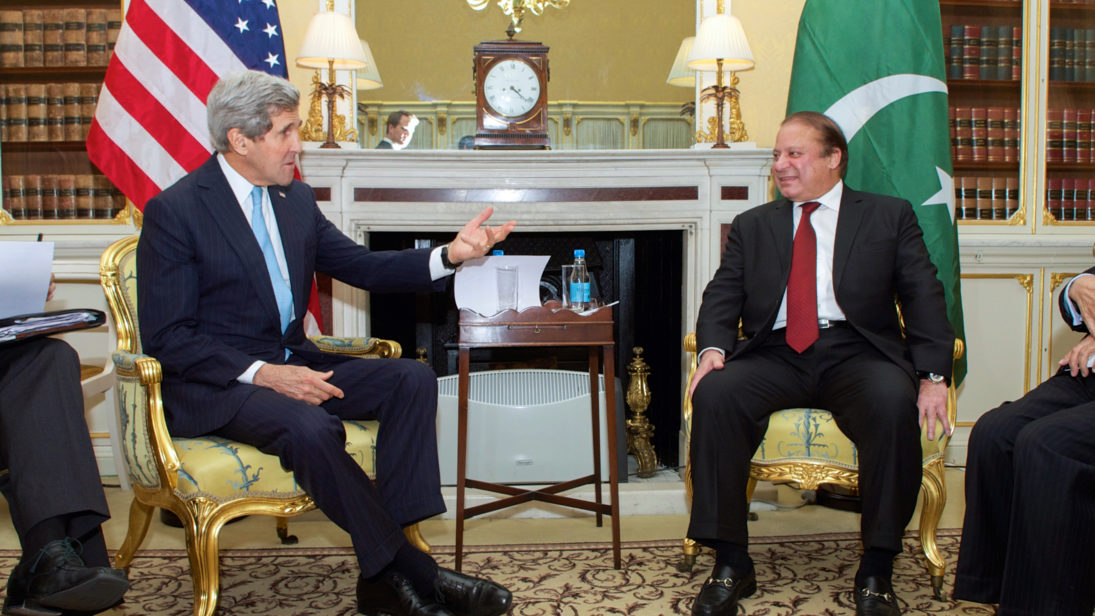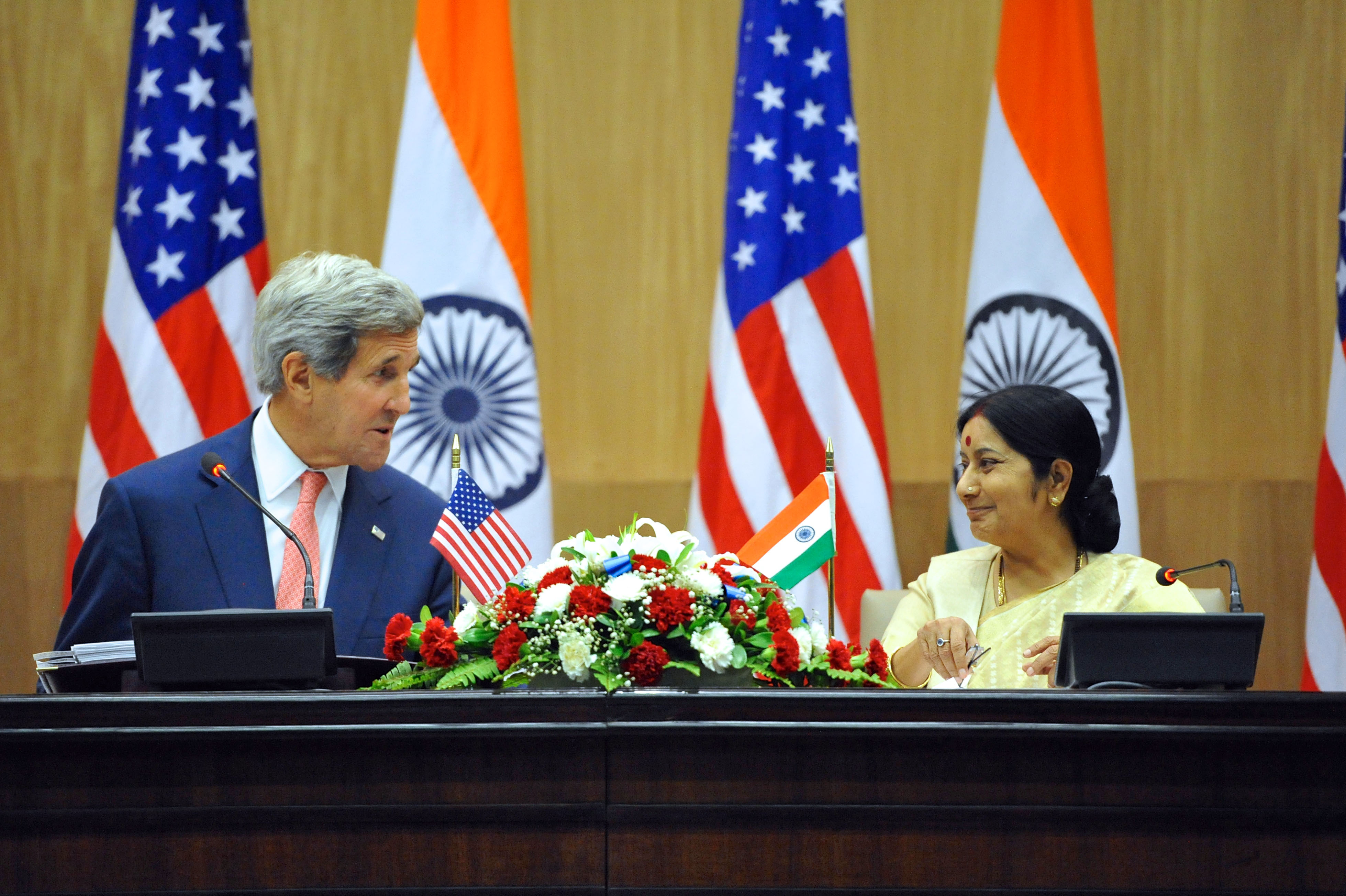
Point, Counter-Point: A Four Part Series
Between the Boots and the BJP, Waning US Influence in South Asia? by Amina Afzal
The Future Role for Washington by Tridivesh Singh Maini
Growing U.S. Role in Indo-Pak Relations by Muhammad Jawad Hashmi
India-Pakistan Relations on a One to One Basis by Reshmi Kazi
***
Indo-Pak relations have seen variety of ups and downs since the early days of their inception. This play of hide and seek in relations has resulted into uncounted loss of lives and economic collapse. Each time peace talks are followed by incidents fueling anger and ultimately calling it off. The present time is a high time in the region in a sense that both capitals are crowned with new leaderships. PM Nawaz Sharif’s visit on PM Narendra Modi’s invitation set a huge milestone in the mutual relationship and gave a clear message to Indian policy pundits of what new government in Islamabad is really up to.
The cancellation of Foreign Secretaries meeting, based on a meeting held between All Party Hurriyat Conference (APHC) and Pakistani High Commissioner to India, however, has put a hold on peace talks. One may ask the BJP Leadership why such meetings have never been cancelled or discouraged in the past? India has never reacted in such a fashion to meetings of Pakistani-Kashmiri delegations ever before. Let me be bold to say that it has crafted a very rigid, and even rude, image of the BJP’s new government in place. Similarly, it has not only aggravated concerns for the common people on both side but also intensified the worries of international community.
In light of the regional geopolitical environment, the pause in the peace talks in South Asia is alarming for all stakeholders. U.S. condemnation is natural as she views both parties as valuable allies. US not only pronounced the stalemate as unfortunate but also encouraged both parties to resume the talks. Additionally, political and strategic stability in South Asia – and particularly in Pakistan – may be in the best interest of the U.S. during the exit from Afghanistan.
As witnessed over time, cross-border firing along the Line of Control (LoC) has been a regular occurrence. Last month it happened in the same way – it is not a new adventure to sabotage such high-level talks. Both parties blame each other for initiating cross border firing but no one is ready to feel guilty. In the meanwhile this blame game is not lowering the threshold but heightening the unrest on both sides. The worrisome aspect is the statement of Amit Shah the BJP president, who calls on a “befitting reply” to Pakistan as a reaction to stop cross-border firing. One may advise Mr. Amit Shah that such a response to the neighbors might not let you acquire the objective of ceasefire.

In my view, current Indian Foreign Policy is marked by aggressive statements and allegations. Moreover, India sees herself as the regional hegemon cum major power in the near future – for which military buildup and obvious support by major powers would be keys for India. The Indo-U.S. Nuclear Deal, while putting aside international norms and violating at least the spirit of the NPT, is a manifestation of the U.S. seriousness to remain in the regional business. The Indian wish to acquire UN permanent seat, membership in Nuclear Suppliers Group (NSG), enhance her nuclear business with Central Asian States and Japan while holding the Chinese card in hand might be considered as the biggest reason for U.S. involvement and soft corner for India to achieve her regional hegemonic aspirations in future. Similarly, it might be related to PM Modi’s upcoming visit to the United States that the U.S. did not boldly condemn Indian allegations and dogged attitude towards peace talks.
For Pakistan, peace and stability in South Asia are linked with the neutrality of the United States. The trends show that U.S. role and influence in domestic and regional affairs of Pakistan is likely to grow in future. For instance, in the recent political crisis the U.S. urged all the stakeholders to peacefully resolve the difference. The U.S. also wishes that Indo-Pak bilateral relations should be returned to normalcy at the earliest and the doors of diplomatic interaction must remain open. It sounds obvious that sustained U.S.-Pakistan relations and stability in Pakistan are essential at this time. Also, it might be considered as a primary step to achieve the short-term (Afghan exit and war against Al-Qaeda) and long-term (Regional) interests keeping the geopolitical importance of Pakistan in focus.
As matters stand today, the U.S. role in the regional affairs has increased with the passage of time and it is likely to increase in future. There are multiple reasons to claiming so: Indo-Pak talks need a trusted mediator right away to bring them to table for negotiations. Secondly, the apparent presence of ISIS literature and possibilities of likeminded terrorist organizations to team up will be alarming for U.S. policy makers. Thirdly, establishment of Al Qaeda’s Indian wing would drag the U.S. into the regional counter terrorism policies in one or other way. Fourthly, U.S. support for India to serve as a regional balance or counter to China would sustain, or even increase U.S. involvement in the region.
***
Image 1: U.S. Department of State, Flickr
Image 2: U.S. Department of State, Flickr